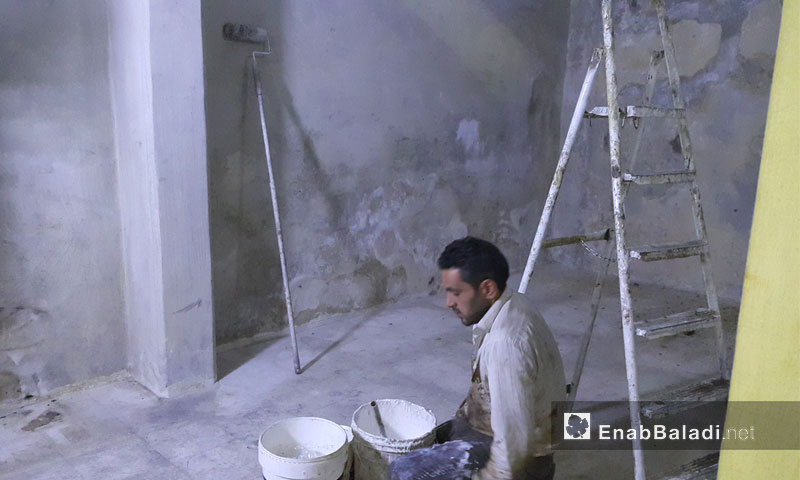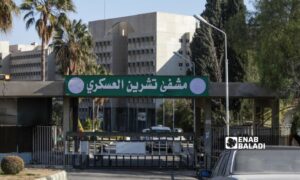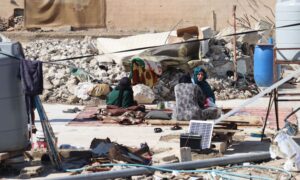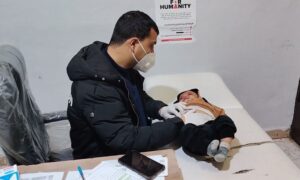
Residents of Ghouta Demand Civil Institutions and Factions Provide Them with Shelters… Is There a Respondent?

Eastern Ghouta – Enab Balad
“There are no shelters where do we go?” The question repeated by residents in Douma city including those who lost family members by bombing. At the same time, civil institutions and bodies use basements as headquarters, and opposition factions occupy other basements in areas close to the fighting fronts.
There are no projects to establish and prepare shelters in Eastern Ghouta, despite the daily bombardment of the area. With the recent escalation of bombardment, especially on Douma city, and the killing of dozens of civilians during the past two weeks, residents are increasingly demanding shelters to protect them, but the demands have not found responsive ears so far.
The Local Committees Are Helpless
Khalil Aybor, an engineer and the head of the Local Committee for the city of Douma said the Committee is currently conducting a comprehensive survey of the status of basements and shelters in the city as well as evaluating the possibility of turning basements into shelters, but he admits the helplessness of those overseeing the issue.
Aybor told Enab Baladi the committee is not fulfilling its actual role, “due to the lack of resources and because the cost of this project is very high.” He pointed out that the committee, “in light of the current circumstances, with the lack of support, stands helpless to service the shelters in the city.”
Aybor confirmed the Committee continues to coordinate with civilians to evaluate the condition of shelters, and the need to build emergency exits in the event the shelters are bombed by providing civilians with technical studies. Aybor explained that the Education Office, the Committee’s Service and Workshop Office, “are searching for shelters close to schools in coordination with the Education Directorate under the control of the Interim Government Ministry.”
A Halted Project
The German Peace organization’s office in Douma city started a project to rehabilitate around 100 shelters in the Eastern Ghouta area, but internal fighting between armed factions months ago halted the project, according to deputy manager of the organization Hassan al-Najar.
Al-Najar said to Enab Baladi that the project started in December 2015 after the increase of bombardment of schools in the Ghouta area, especially in the city of Douma; the project’s primary target is school children. Al-Najar clarified that although the project phases have not been completed, the organization had rented shelters and basements for one year, and worked to rehabilitate some general basements such as school basements.
The project team rehabilitated 17 shelters, (70%) targeting schools, according to al-Najar. He confirmed the team found several shelters buried under rubble, and they managed to rehabilitate some of them by providing water, electricity, ventilation, and supplying some of them with energy using solar panels.
With the factions fighting, work on the project stopped after the team prepared ten shelters in Douma, two shelters in each of Saqba and Haresta, and one in each of the areas of al-Rihan, Hamouriyah, and Zamalka according to al-Najar. The deputy manager explained that the greater number of shelters were set up in Douma due to its large population in comparison with the other cities and towns of Eastern Ghouta.
The organization team is trying to begin work again on the project al-Najar explained. Regarding the difficulties the team faced previously, he said the most important was searching for the shelters under the rubble, and that some of the residents are fearful of the idea of a shelter being close to their houses, “So the regime will not target it and damage those nearby.”
Individual Solutions: Rooms Under Houses
Despite the general lack of shelters, the Ghouta area still has some, but they are ill equipped for use, according those Enab Baladi surveyed about the issue. House owners, whether of illegal housing settlements or Arabic style houses, which do not have basements, resort to individual solutions in the absence of any active role played by the Local Coordination Committees and other concerned institutions.
Saeed Flaytani, a resident in a popular neighborhood in Douma, said he started digging a room seven meters underground a few days ago, “I used to put my family inside the bathroom during the bombing, then I decided to build a room underground as a precaution against the cluster bombs at least.”
The cost of digging one-meter underground is 4000 Syrian Pounds, and whoever digs one room (including a passage, entrance and exit) pays 120,000 Syrian Pounds, according to Flaytani. He confirmed that some residents began digging a room under their houses while others who do not have enough money depend on residential building and mosque basements.
Mohammad Adnan, a resident of the city of Douma, said shelters are a priority for the residents of the Ghouta. He explained that civil institutions use basements as warehouses, and they have priority while residents do not find basements to take refuge in during aerial bombardments.
Adnan lives on the fourth floor in an apartment building, and explained that there is a shelter close to him in the nearby market area, but it closes its doors at sunset, “And we cannot open it in the event of bombing during the night.” He demanded the Local Council and the concerned authorities provide shelters, “To perhaps decrease the number of those who fall victim to this insane bombing.”
Flaytani continues his digging, and Adnan and his family repeat their running to the lower floors of the apartment building with each air raid. There is no foreseen solution to give residents of Eastern Ghouta a safe haven to shelter them from missiles and mortars.
if you think the article contain wrong information or you have additional details Send Correction
النسخة العربية من المقال
-
Follow us :

















 A
A
A
A
A
A








 More Society
More Society